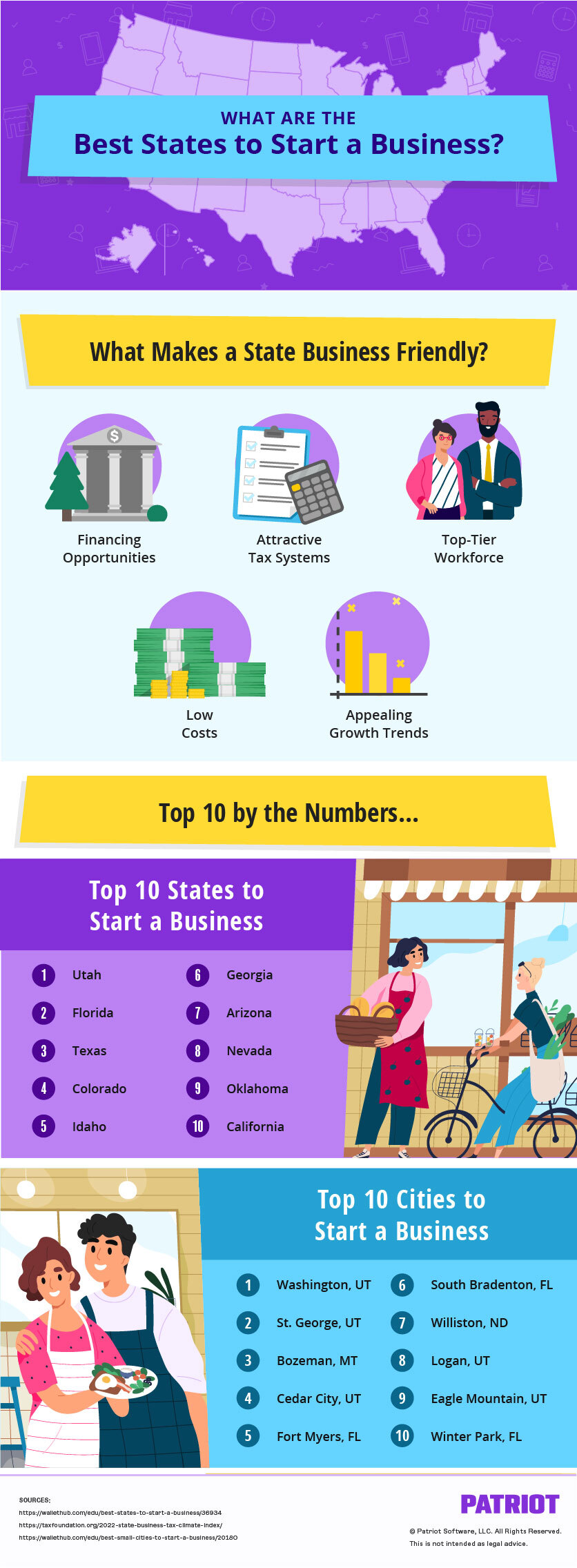Ah, location, location, location. Choosing where to open up shop is one of the first and most important decisions you’ll make when starting a business. But, location isn’t just about picking a building on a popular street corner. It’s also about selecting a state to do business in—the best state to start a business.
So, which state should you choose for your business? Your home state? What about your dream state? The most populated state? Least populated?
There’s a lot to consider. After all, the best state to start a business depends on several factors. Read on to learn what those factors are and the best states for starting a business, according to research.
The best state to start a business depends on these 5 things
What about a state makes it the “best” for small business startups? Business-friendly states earn their names for a reason. In fact, there are five of them.
If you want to know the best states for entrepreneurs, consider looking at:
- Financing opportunities
- Tax systems and incentives
- Workforce
- Costs
- Growth trends

1. Financing opportunities
You can’t start a business without funds. If you don’t have the money to start and run your company, you won’t be able to see your dream take flight.
Most business owners don’t have the money to bootstrap their enterprises completely. Instead, they need to seek opportunities for financing a small business.
Business financing options include:
- Personal savings (bootstrapping)
- SBA or business loan
- Credit cards
- Crowdfunding
- Family or friends
- Venture capital
In short, there are several financing options you can pursue to fund your small business idea. However, financing is more accessible in some states than others.
The best states for financing (and the worst)
Unless you can bootstrap your business or rely on family and friends, you might consider the best state to start a small business for financing.
According to a WalletHub study, these are the states with the most and least accessible financing:
| Best States for Financing Opportunities | Worst States for Financing Opportunities |
|---|---|
| South Dakota (tied for 1st) | New Mexico |
| North Dakota (tied for 1st) | Wyoming |
| Utah (tied for 1st) | Oregon |
| Hawaii | Arizona |
| Iowa | Nevada |
2. Tax systems
Some states (and cities) are more friendly than others when it comes to business tax liability.
Many states tack on significant tax responsibilities for businesses, including high tax rates and complicated systems.
Tax-friendly states earn their name because their tax systems appeal to business owners.
States with attractive tax systems don’t have one of the following major taxes, or they have a low tax rate:
- Corporate income tax
- Individual income tax
- Sales tax
Additionally, tax-friendly states simplify taxes. This can either mean that business owners pay a flat rate or that tiered tax rates are easy to understand.
The best states for tax systems (and the worst)
When it comes to taxes, what’s the easiest state to start a business? According to a study by The Tax Foundation, these are the top five states that make the cut—and the five worst ones:
| Best States for Tax Systems | Worst States for Tax Systems |
|---|---|
| Wyoming | New Jersey |
| South Dakota | New York |
| Alaska | California |
| Florida | Connecticut |
| Montana | Maryland |
3. Workforce
A big part of business success depends on employees. Hiring workers without the skills, knowledge, or attitude to excel is a recipe for disaster.
Hiring someone who isn’t a good fit is frustrating. But, there is a situation that is possibly worse: not being able to hire anyone at all.
When choosing a state to start your business in, consider one or both of the following:
- Availability of human capital
- Whether the labor force has the necessary skills and knowledge
If your business needs as much labor as it can get, consider starting your venture in a state with high human resource availability. And depending on your niche, you may need employees with specific skill sets and education.
Before starting your business, estimate how many employees you’ll need. And, determine the range of positions and skills your business needs to operate successfully.
The best states for workforce (and the worst)
According to WalletHub, these are the states with the highest and lowest availability of human capital:
| States With the Highest Availability of Human Capital | States With the Lowest Availability of Human Capital |
|---|---|
| Nevada | Massachusetts |
| California | New Hampshire |
| Hawaii | Minnesota |
| Mississippi | North Dakota |
| New York | Vermont |
And, let’s not forget the importance of education for certain jobs. Here are the states with the most and least educated population:
| States With the Most Educated Population | States With the Least Educated Population |
|---|---|
| Massachusetts | Kentucky |
| Colorado | Louisiana |
| Maryland | Arkansas |
| New Jersey | Mississippi |
| Connecticut | West Virginia |
4. Costs
Something else that determines the best states to start a business in is cost. So, how much are you willing to pay for:
- Office space
- Labor
- Living
Securing inexpensive office space only matters if you don’t run your business from home. But if you need cheap office space, you might compare costs by state.
Employee wages are one of the most (if not the most) expensive costs business owners have. Deciding how to set salaries for your workers largely depends on location. This is why the BLS offers wage data based not only on occupation but on location as well.
Cost of living goes hand in hand with low labor and property costs. Cost of living is the cost of necessities like housing and food. Not only does a low cost of living drive down your personal expenses, but it also impacts wage averages for the state or city.
Cheapest state to start a business (and priciest): Office space
Need a room with a view? Or maybe just a space that isn’t in your apartment or house? These are the states with the cheapest and priciest office spaces, according to WalletHub:
| States With the Cheapest Office Spaces | States With the Most Expensive Office Spaces |
|---|---|
| Iowa | New Jersey |
| Maine | Maryland |
| South Dakota | Alaska (tied for 3rd most expensive) |
| Montana | California (tied for 3rd most expensive) |
| Minnesota | New York (tied for 3rd most expensive) |
Cheapest state to start a business (and priciest): Labor
What are the most inexpensive states when it comes to labor? According to the BLS, these are the states with the lowest and highest labor costs:
| States With the Lowest Annual Mean Wages | States With the Highest Annual Mean Wages |
|---|---|
| Mississippi | Massachusetts |
| West Virginia | New York |
| South Dakota | Washington |
| South Carolina | California |
| Louisiana | New Jersey |
Cheapest state to start a business (and priciest): Cost of living
When it comes to cost of living and housing affordability, these are the most and least affordable, according to U.S. News:
| Most Affordable States | Least Affordable States |
|---|---|
| Ohio | Hawaii |
| Oklahoma | California |
| Michigan | Massachusetts |
| Iowa | Alaska |
| Missouri | Oregon |
5. Growth trends
Who doesn’t want a future filled with business growth when starting a company? Most business owners hope their startups will grow and expand with hard work, time, and energy.
So, what exactly does growing your small business mean? Three main indicators of business growth include:
- An expanding customer base
- Profits
- Overall business growth
Business growth is more common in some states than others.
The best states for growth (and the worst)
According to the WalletHub study, the following states have the highest and lowest average growth in number of small businesses:
| Highest Average Growth in Number of Small Businesses | Lowest Average Growth in Number of Small Businesses |
|---|---|
| Idaho | Kentucky |
| Utah | North Dakota |
| Nevada | Missouri |
| Florida | Vermont |
| Delaware | West Virginia |
Best states to open a business: And the top 10 states are…
Now that you know what contributes to a state’s “best state for business” ranking, it’s time for the big reveal. What is the best state for business owners?
Using factors like business environment, access to resources, and costs, WalletHub ranked Texas as the best state for business owners.
According to WalletHub, the 10 best states for business are:
- Utah
- Florida
- Texas
- Colorado
- Idaho
- Georgia
- Arizona
- Nevada
- Oklahoma
- California
What about top 10 cities?
If you want to get into specifics, these are the 10 best small cities for starting a business (spoiler alert—half are in Utah!), according to WalletHub:
- Washington, UT
- St. George, UT
- Bozeman, MT
- Cedar City, UT
- Fort Myers, FL
- South Bradenton, FL
- Williston, ND
- Logan, UT
- Eagle Mountain, UT
- Winter Park, FL
The takeaway
Your takeaway shouldn’t be to flock to the number one business-friendly state or city. Instead, you should consider all the factors that go into deciding on a location, like costs and resources.
What your startup needs likely differs from what another startup needs. For example, things like cheap office space or high human capital availability may not be relevant to your business.
So before you rush to Texas to open up shop, remember that there are many factors to consider. And again, some factors that go into the “best states to start a business” rankings may not apply to your business needs.
Once you start your business, remember to keep organized accounting records! Simplify recordkeeping with Patriot’s accounting software. Receive and record invoices, seamlessly enter balances, reconcile your bank statements, and more. Get started with your free trial today.
This article has been updated from its original publication date of July 16, 2019.
This is not intended as legal advice; for more information, please click here.





